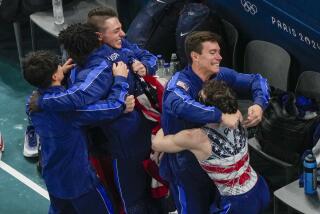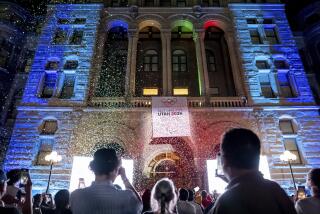U.S. Turns Skeleton Key
- Share via
PARK CITY, Utah — Jim Shea Jr., son of an Olympic skier and grandson of an Olympic gold medal-winning skater, won the men’s skeleton race Wednesday in a storybook victory that served as a ringing affirmation of the Olympic spirit and the value of family and community.
In triumph, however, there also came a reminder of the way life’s most joyous moments can sometimes be so bittersweet. Shea’s 91-year-old grandfather, Jack, died last month after a van that police said was driven by a drunk driver slid out of control on a road in Lake Placid, N.Y., striking Shea’s car.
If only, friends and family said, the elder Shea could have lived just a few weeks more, to watch his grandson will his way to gold in the first men’s skeleton competition in the Winter Games since 1948. Racing a sled headfirst down the icy Olympic bobsled course at speeds approaching 80 mph, the grandson carried with him--safely tucked into his helmet--a photo of his grandfather.
“I definitely felt him here today,” the 33-year-old from Lake Placid said of his grandfather, adding, “He had some unfinished business before he went on to heaven. Now he can go.”
Jim Shea Sr. felt it too: “I think my dad, his grandpa, was there giving him that little extra push.”
Shea’s win marked the first of three medals the U.S. team won Wednesday in skeleton racing. Shortly after Shea took first in the men’s event, Tristan Gale, 21, of Salt Lake City, who works at a Home Depot store, slid to first in the inaugural women’s skeleton competition and Lea Ann Parsley, 33, of Granville, Ohio, a firefighter and registered nurse, took silver.
Jim Shea Sr. and Jr. were honored as two of the final bearers of the Olympic torch before the lighting of the caldron at Rice-Eccles Stadium during the opening ceremony.
Jack Shea was supposed to have been there too--making it three generations of U.S. Olympians, believed to be a first for the United States in the history of the modern Games.
Jack Shea won gold in the 500- and 1,500-meter speedskating races in the 1932 Lake Placid Games. Jim Shea Sr. competed in three Nordic events in the 1964 Winter Games at Innsbruck.
Jim Shea Sr. called Wednesday “the most special day in my life. Seventy years ago, my dad, Jimmy’s grandfather, won [two gold medals] at the 1932 Games. Now, to have that repeated by his grandson--words cannot describe the joy that my entire family and community has for Jim.”
The grandfather passed on to his son and grandson the reasons to keep believing in the Games despite corruption, scandal and commercialization--the reasons why it’s still possible to retain a sense of idealism, why the Games remain a vessel into which people from around the world invest their hopes and dreams.
“My dad preached the true Olympic gospel of taking part in friendly competition for the honor and glory of sports,” Jim Shea Sr. said Wednesday. “He ingrained that in Jimmy’s mind.”
But the elder Shea wasn’t willing to let his vision of the Olympic ideal, no matter how central it was to his soul, be used for propaganda purposes. After winning two gold medals in 1932, he was still the best in the world four years later when the 1936 Winter Games were to be held in Garmisch-Partenkirchen, Germany. But Shea, whose father owned a Lake Placid grocery that served many Jewish customers, refused to go. It was his way of protesting what he called the “crime against humanity” that was occurring in Germany in the 1930s--the years leading up to the Nazi holocaust.
This past December, Jack Shea carried the Olympic flame around the Lake Placid skating oval and then gave a speech that moved many in the audience to tears.
Skeleton riders slide down the bobsled course on special sleds, face-first, arms at their sides, chins only inches off the ice.
Skeleton racing was featured in the Games in 1928 and 1948, both times in St. Moritz, Switzerland, where the sport originated on a course called the Cresta Run--to this day still crafted each winter from snowfall.
“They say bobsled is the champagne of thrills,” Jim Shea Jr. said Wednesday. “Skeleton is definitely the moonshine of thrills.”
Over the past several years, Jim Shea Jr. has been a vocal advocate for the return of skeleton to the Olympic program. The family lineage and his own increasing visibility--he won the 1999 world championship--helped in the lobbying effort.
Although he made plain Wednesday that it was far from a one-man effort, he joked: “I knocked on every outhouse, doghouse, henhouse. I even went to the White House, twice.”
He said skeleton is now a “fast-growing sport,” one that has gone from “the back page to the front page” in recent months.
Perhaps that’s because it’s one of the few Olympic sports that involves sensations almost everyone can appreciate, at least anyone who has ever slid down a snowy hill on a sled or even on a garbage can lid, Shea and others said.
Organizers sold 15,000 tickets to Wednesday’s race; racing began at 9 a.m. and at 6:45 a.m., even though it was snowing heavily, spectators were lined up 10 deep at the airport-style metal detectors, eager to get in.
Wednesday’s Olympic final drew 26 racers for two runs. The course features 15 turns and is just over three-quarters of a mile long.
On the first run, Shea, starting fourth, recorded the fastest time, 50.89 seconds, .13 ahead of Austria’s Martin Rettl. Switzerland’s Gregor Staehli was .27 back.
On their second runs both Rettl and Staehli finished in exactly the same time--50.99 seconds. With Shea at the starting gate, Rettl had the lead, Staehli was in second.
Heading into the bottom part of the course, Shea was slightly behind Rettl’s combined time, according to race results. But, somehow, Shea picked up speed and finished in 51.07--a combined time of 1:41.96, a mere .05 ahead of Rettl. Staehli dropped to third, in 1:42.15.
At the finish line, Jim Shea Jr. fumbled for the photo of his grandfather that went with him, finally got it out of his helmet, showed it to anyone who wanted to see, clambered on walls, slapped high-fives with fans, breathlessly did TV interviews--and hugged Rettl and Staehli, his good friends.
He dedicated his victory to “all the sliders who came before me.”
Watching her son reveling in the moment, Jim Shea Jr.’s mother, Judy, said, “Grandpa would have loved it.”
Her husband, Jim Shea Sr. agreed: “He’d have cried.”
More to Read
Go beyond the scoreboard
Get the latest on L.A.'s teams in the daily Sports Report newsletter.
You may occasionally receive promotional content from the Los Angeles Times.






